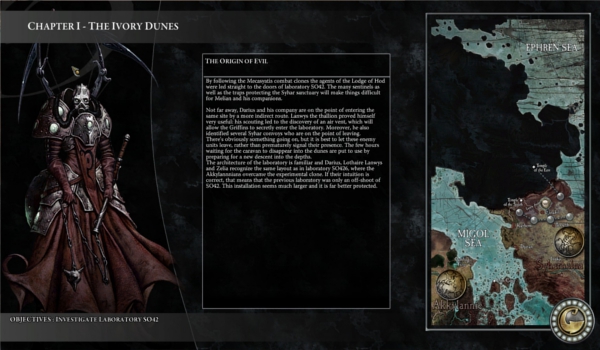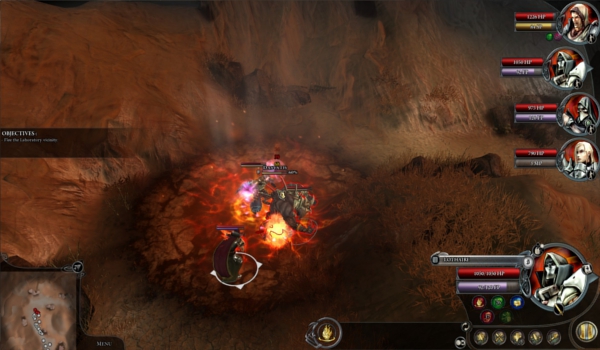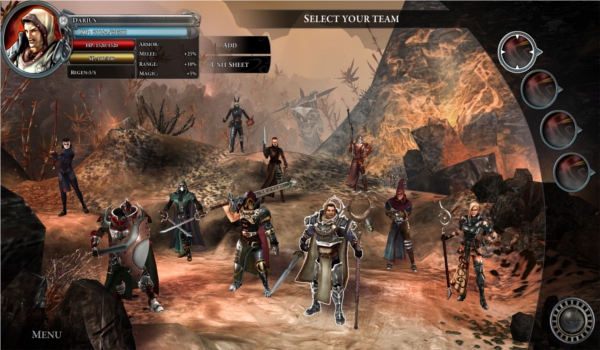As you approach that weapon-obelisk you’ve been eyeing from across the valley, two hulking orcs appear in your field of vision as you grow nearer. You send Darius, the paladin, charging forward with sword in one hand and shield in the other. He is sure to keep their attention as your team of four dispatches the two green-skinned warriors to the afterlife. But what is this? Your gun-wielding healer in the backline has been ambushed by another group of orcs. You pause time to get a handle on the situation to reposition your team and give them each their up-coming orders to execute when time begins to flow once more. You move the ambushed healer into friendlier territory, taunt one enemy with hopes of stripping one of the orcs off the wounded healer, and tell your mage to cast fear into another orc as to cause the creature to flee and give your healer a moment of relief. Time recommences and the battle rages. Spells contort through the air, swords and maces alike create a maelstrom of rent flesh, and words of healing mend eviscerations. It is quiet now; the crescendo of battle has passed into silence. After conquering the colossal green ambushers you harvest your experience points and seize that obelisk you were after. Victory is yours.
The combat and battle situations that wage in Confrontation can be quite good at times, but that is the extent of the game’s pleasures. The combat tale above could sound eerily familiar to you if you’ve ever played a fantasy game before. But, if you put aside the paladin, orcs, mages, and healers you’ll see this is the relatively new fantasy world of Confrontation. Confrontation is developer Cyanide’s introduction to this new fantasy world through the eyes of a tactical role-playing game based on Rackham miniatures. The feel and mentality of Confrontation is at heart something very similar to another table-top game originated in miniatures – Warhammer.
If this is not your fist tactical RPG then the situational elements and the characters that rule Confrontation will seem extremely familiar to you, even if it is a relatively new fantasy world. The game handles like an RTS and plays similar to a group-based RPG like Dragon Age: Origins. If the mythos and gameplay of Confrontation is not a bit cliché, then it is most definitely derivative because nothing in Confrontation is truly innovative.
The story and lore of Confrontation try to bring something fresh to the world of fantasy, but they fall short. The platitudes start right at the get-go of Confrontation with a formulaic fantasy beginning. Your motley band of holy crusaders is led by Darius to stop some wrong-doers. You’re in search of the entrance to a techromancer bunker named SO42. This may sound like it is actually pulling away from cliché elements, but the narrative is conveyed so poorly that it is nearly impossible to understand. Confrontation’s incomprehensible story is due impart to the attempt at originality, but mostly due to bad narration.

All important plot points are told from the voice of a narrator. The narrator might ramble-on for five minutes straight about things that have no context. He might go on in length saying things like “Akkylanian-this” and “Mecasyatis-that”. All the while, you’ve only just met Darius and his band; you have no idea what these people or places are. Are they people or places?
Narrations rattle off names and places like you’re familiar with the lore. Sadly, most of these factions, names, and places are never shown within the game world itself. If they are in the game then they’re implemented so inadequately that they’re extremely difficult to put names to faces or factions to places. The narration never gives the player any association by verbalization because it seldom shows what it is talking about when it is talking about it. By not showing many of these different places, faces, and factions simultaneously with the narration, it derives no visual continuity between the story and the goings about of the game’s tale. There is simply a lack of cohesive storytelling to give the player a good idea to the context of what is supposedly happening around them.
When the narrator discusses a new location it is difficult to tell one place from the next because each setting is so similar from one stage to the next. Environments are like walking through a hospital you’ve never been to before. The interiors are so repetitive and similar all around that you can very easily get turned around or think you’re in a place that you’re are not. Similarly, the layout and look from one techromancer bunker or from one orc village to the next might have you saying “wait…haven’t I been here before?” Just like in a good hospital though, taking a look at a map will have you headed in the right direction in no time. It’s the actual level design that leaves a lot to be desired because the layout of stages is very segmented, linear, and repetitive.
Environments do try to throw puzzles and hazards at you to shake things up a bit which can also play into combat in an interesting way. A hazardous room may fill with toxic gases forcing your group to either retreat out of the room or send one friend through a group of foes and toxic clouds to turn off the poisonous fumes. A puzzle could have two teammates in separate rooms with the goal of pulling two levers simultaneously. Just as you start to believe that you’ve discovered how to open that doorway that’s been blocking your path, one gate slams shut and randomly traps one of the two teammates. With one friend trapped behind a gate your team will have to face the group of enemies that has rushed through the breached doorway one teammate short. There is not much variety beyond this though. Once you’ve seen two of Confrontation’s puzzles you’ve seen them all. This is mostly due to the fact that none of the puzzles rise above a few simple switches in a room.
Your surroundings try their best to enhance combat situations through puzzles and hazards, but ultimately narrow corridors and limited level design nuances hurt the gameplay. This is mostly a result of rudimentary flaws in character order execution and stage design. A level’s segmented and narrow design impedes an already faulty character movement system. Characters might run in place when nothing is blocking their path or they might say “I can’t reach my target” when they’re literally standing on top of their objective. Squad movements, positioning, and executable abilities are a rudimentary aspect of a tactical turn-based RPG. In RPGs like this, positioning and movements hold the utmost importance. When a character can’t activate their skill or move properly when they’re called to do so because of simple targeting or path finding issues, it can be game breaking and spell death frustratingly often for reasons that are the game’s fault and not your own. These issues become extremely tiresome and grow beyond simple missteps far too often.

Aside from that, the fundamentals of Confrontation’s combat are quite good. Like in many other squad and turn-based RPGs you’ll have to prioritize enemies based on their relevance. You need to kill healers first or put that special paladin class that makes all of its other teammates immune to death at the top of your to-kill list. Freezing one enemy in place while knocking another prone will help keep the crowd under control when you’re outnumbered. Prioritization of enemies and intelligent use of abilities does keep the combat tactical and intriguing for a while. Skill, spell, and attack animations are flashy and breathe life into an otherwise dated-looking game. Fire shockwaves emit from swords, floating skulls strike fear, arrows rain down, and holy hammers of light give combat great pizazz.
The allure of combat is short-lived though. Other games of this sort usually have you create your own team and then you customize each individual’s class, abilities, and gear yourself. Confrontation doesn’t have that. Instead, there are a dozen-or-so pre-rendered characters. There is no equipment to suit your team with, only weapon-obelisks within a stage that can improve each character’s weapon of choice. When you level-up you’ll get one attribute and talent point to distribute. All characters have the same attributes of strength, wisdom, constitution, and so on, but talents are what differentiate one character from the next. Instead of choosing talents from a library of abilities, each pre-rendered character’s talents are fixed and you unlock them as you level-up. All of the different characters have four-to-six talents to discover and you’ll have all of those talents unlocked in a handful of hours. The inability to change a character’s talents or weapons means that every character’s role will never change. With little in the way of personalization of your team, the tap of fresh gameplay runs dry early in Confrontation because of how quickly you’ll see everything each character has to offer and many of the new characters you’re recruiting later in the game have the exact same talents as previously obtained characters. The gameplay does not stay fresh for long.

Confrontation’s combat is good at its core and is the game’s strongest feature, but other faulty game implementations drag the game’s appeal down with it. A lack of value rings true throughout the game. To date, the multiplayer is not worth mentioning because it is practically non-existent. The feature is there, but multiple people to take part in a session are not. Frustratingly problematic character positioning and movements lead to death or have you micromanaging your team, not because you want to, but because the characters can’t follow your initial commands. Also, with no gear or equipment and an extremely limited talent customization model, it is hard to keep an interest and to invest in Confrontation’s characters. The lack of interest in the game’s characters is only exemplified by the lousy use of narration and storytelling. The tactical combat may have potential, but all of the inferior characteristics pull down vigorously on the best feature of the game. Confrontation’s combat cannot shoulder the burden alone.